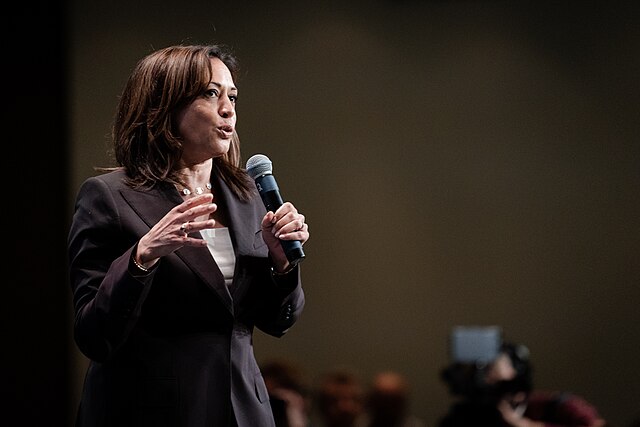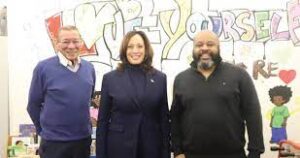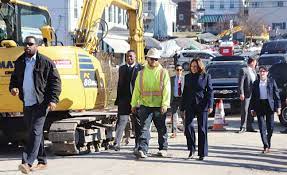
By Rob Taylor Jr., Courier Staff Writer , NNPA
Vice President of the United States, Kamala Harris, spent about 10 minutes on Tuesday, Feb. 20, speaking to a crowd of supporters at the Kingsley Association in East Liberty, adamant about replacing lead pipes in Pittsburgh, the state of Pennsylvania, and all around the country, in the fight for clean water, free of toxins.
To a hail of applause, Harris announced that $5.8 billion in funding, including more than $200 million specifically for Pennsylvania, was being allotted for clean water infrastructure from President Joe Biden’s Investing in America agenda. The announcement brought the total amount of clean water funding announced by the Environmental Protection Agency from President Biden’s Infrastructure Law to $22 billion. Overall, the Infrastructure Law will invest over $50 billion in total to upgrade America’s water infrastructure, the largest investment in clean water in American history.
“Hello Mr. Doss, how are you?” Harris said. “It’s good to be with you.”
Rod Doss, the longtime editor and publisher of the Courier, greeted Harris and told her, “I’m staring at history. This is truly a moment for me.”
Harris told Doss that she was glad to have some time to talk, “because your paper, and what you do in terms of the voice that it represents, and a trusted voice, is so important.”
For more than 100 years, Pittsburgh’s African American community has counted on the Courier to cover the most important stories that affect the Black community, and it was obvious that fact wasn’t lost on the vice president.

No questions were out-of-bounds. No questions were shared with Harris beforehand. Courier managing editor Rob Taylor Jr., who was also part of the exclusive interview, told Harris she seemed passionate and driven to tackle the lead pipes and clean water issue head-on, particularly in Black communities.
“As I said earlier, lead pipes were standard for construction across the country, but then it became increasingly obvious that the water coming out of those lead pipes was toxic which results in health impacts, in terms of health well-being, but also learning impacts for children,” Harris told the Courier. “In communities where the resources were there, in homes where there was a homeownership or people (had) the resources, they can remove the lead pipes. But not in communities that didn’t have the extra, or didn’t have savings, or didn’t own their home and rented. What you ended up seeing is that while the lead pipes affected everyone, not so equally.”
Speaking specifically to the Infrastructure Law, officially signed into law by President Biden in November 2021, Harris said that the funding to fix sidewalks or replace lead pipes not only creates jobs, or in her words, “an economy around the upgrades,” but the “other piece of the lead pipes issue is absolutely about public health. It’s about the physical well-being, about the well-being of families and we have to take that seriously. And as I said earlier, government has a few specific responsibilities and one of them is to address the public health needs of the community. That’s how I think about the lead pipe issue; what do we need to do to get the resources into the community to take those lead pipes out, knowing it will benefit our children, it will benefit families and it will uplift communities.”

Doss then addressed the issue that has been permeating throughout the nation, brought more to light by a popular Black radio personality, Charlamagne Tha God. The radio personality said on Feb. 18 on ABC News’ “This Week” that he felt there was a general apathy from younger voters about either of the presidential candidates, Donald Trump or President Biden. Moreover, Charlamagne Tha God called President Biden “an uninspiring candidate.”
Doss pressed Harris on that perceived growing lack of enthusiasm from young voters as it relates to supporting the Democratic Party and the Biden/Harris ticket.
Harris prefaced her response by saying she hadn’t seen the Charlamagne Tha God interview on ABC News. But in general terms, “we are up for re-election, and any candidate up for election or re-election has to earn the votes, and I’m very, very clear about that. Which is why I’m here in Pittsburgh, which is why I’m traveling around the country to make sure that people know what we have accomplished in response to what they asked us to do in 2020, because people turned out in record numbers, young voters turned out in record numbers…and they said, ‘fix the lead pipes.’ They said in the Black community, ‘we are 60 percent more likely to be diagnosed with diabetes, bring down the cost of insulin for our seniors,’ and we’ve now capped the cost of insulin at $35 dollars a month. Folks said deal with the fact that HBCUs (Historically Black Colleges and Universities) are centers of academic excellence, but don’t necessarily have the kind of endowments that other universities do…we have now dedicated over $7 billion to HBCUs.”
Harris continued: “People said deal with Black unemployment; we now have the lowest Black unemployment in the history because of the work that we have done. That’s about building jobs and creating opportunities for not only employment, but for wealth-building. People said deal with the fact that Black businesses don’t get federal contracts in the same way that other businesses do. We have made a pledge which we are on track now to achieving, increasing federal contracts by 50 percent to minority-owned businesses. So this is some of the work that we have done and it is incumbent on us in an election season to let people know that we heard them, we have delivered and therefore believe that we have earned a re-election.”
Harris is the first HBCU graduate to work in The White House as President or Vice President. Harris graduated from Howard University, in Washington, D.C., in 1986. And she and President Biden obviously want to continue working in The White House for another term, though the former President, Trump, is lurking. While he hasn’t officially been named the Republican nominee for president, it’s pretty much a foregone conclusion barring a miracle from opponent Nikki Haley.
Harris told Doss and Taylor that she and President Biden have to do “the hard work” in reminding people about what they’ve done as President and Vice President. “On the one side, you got the former president who admires dictators, who openly has talked about his pride in taking away freedoms. On the other hand you have our re-election in Joe Biden who has been a champion for what we need to do around equity, what we need to do around resources to community, around working people, around bringing down the cost of prescription drugs and taking on big pharmaceutical companies. So, the closer we get to the election, I think the more people are going to start tuning in to the fact that you’ve got one of two choices, and I think the biggest decision that people are going to make this election is, deciding what kind of country we want to live in.”
Taylor then reminded Harris that Pennsylvania is a “critical” state in this election season, as it seems to be in each presidential election.
“Allegheny County made all the difference,” Harris responded to Taylor and Doss. “The voters here turned out in record numbers and it is why I am Vice President of the United States as the first woman and the first Black woman. Why do I keep coming back to Allegheny County and coming back to Pittsburgh? First and foremost, it’s to thank everybody, because it is the people here who, in large part, did the work of helping to create history around this position, and so I’m here to thank folks and to remind them of their power and ask them to please, let’s do it again.”
The 10-minute interview concluded between Harris and the Courier representatives. Photos were then taken, and Harris was about to be whisked away to an on-site meeting with workers from the Pittsburgh Water and Sewer Authority and other contractors as they removed a lead pipe from under the ground in the Elliott neighborhood of Pittsburgh.
But before she left the Kingsley Association, Taylor jokingly asked her one final question.
“The real H-U?”
Harris responded: “You know.”



